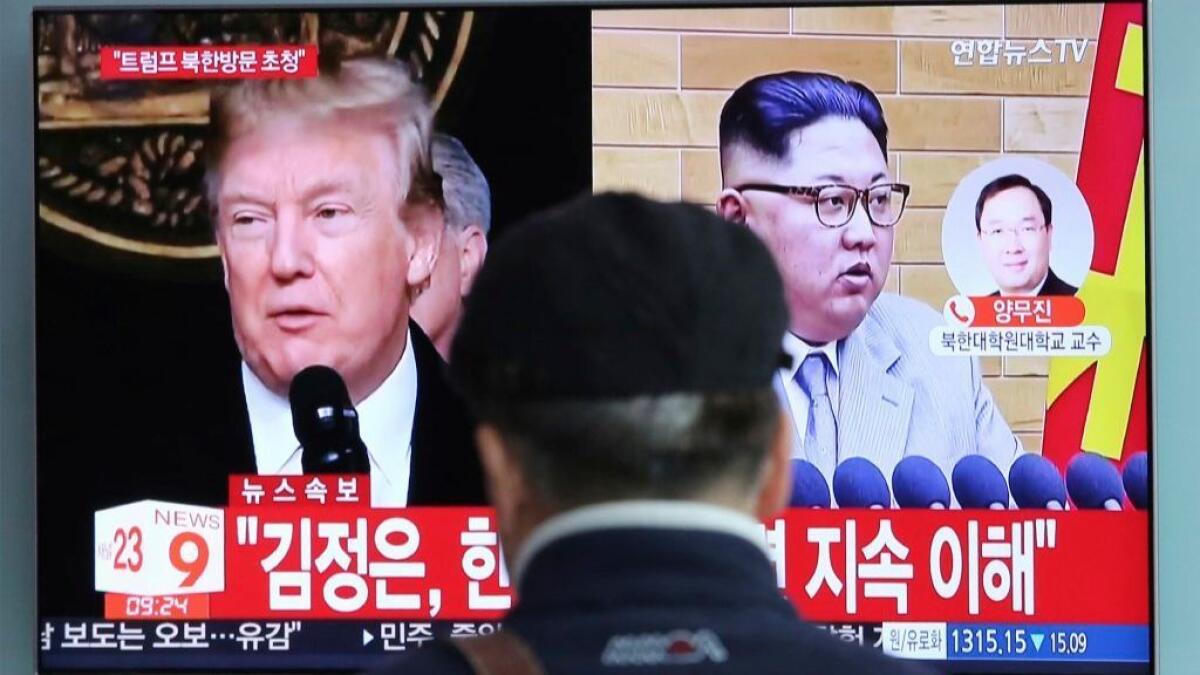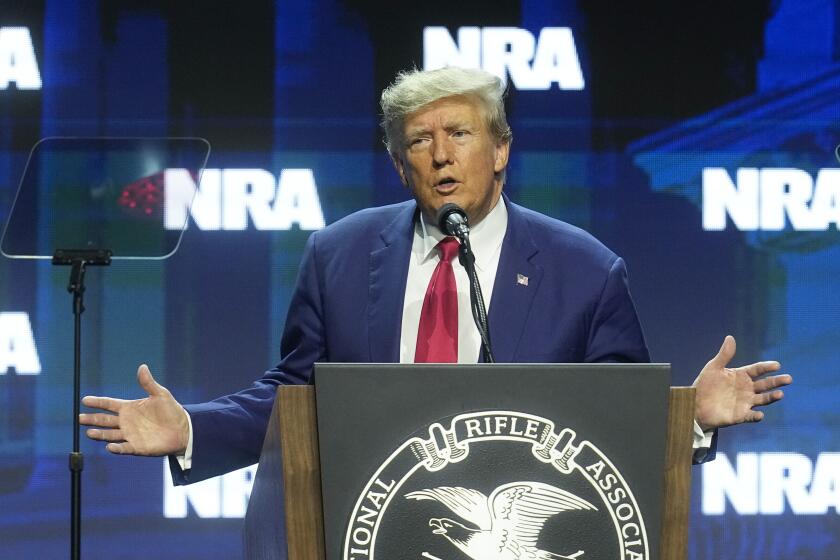Op-Ed: Trump’s talks with Kim will very likely fail. What then?

Here what’s most important for the United States in any dealmaking with Kim Jong Un: to ensure that North Korea never uses its nuclear weapons. Thankfully, our overwhelming conventional and nuclear deterrent is a fail-safe if talks fail and a deal remains out of reach.
At first blush, it is difficult not to treat President Trump’s decision to meet Kim face to face as a potential breakthrough, given the absence of any diplomatic momentum in years past. Nuclear negotiations with the North Koreans have been dead since 2012, when Pyongyang reneged on an agreement to place a moratorium on its nuclear activity and ballistic missile tests. The multilateral six-party talks have been dormant for nine years. Any progress toward a diplomatic process is a significant development.
The Trump administration should poke and prod the North Koreans to determine whether they are truly interested in denuclearization this time.
In the real world, however, the frantic dialogue between North and South Korea since the Winter Olympics and the Trump-Kim summit now planned for May — including Pyongyang’s sudden eagerness to discuss denuclearization — have more than a decent chance of fizzling before a comprehensive accord is reached.
The history of North Korean nuclear diplomacy is a roller coaster ride of lost hopes and misplaced expectations; just when world diplomats think they have arrived at an agreement, the Kim regime either violates the terms or balks at establishing verification mechanisms. More than 26 years ago, Kim’s grandfather signed a declaration pledging “to eliminate the danger of nuclear war through the denuclearization of the Korean peninsula.” In 2005, Kim’s father did exactly the same thing. The bottom line is that we can’t know for certain that Kim Jong Un is sincere in his offer to negotiate, let alone to strike a deal that would make denuclearization a reality.
Trump has an obligation to tread these diplomatic waters carefully. However eager Kim is now to meet and possibly to negotiate, he will not abolish his nuclear weapons arsenal for free. The price could be any or all of the following: withdrawal of U.S. troops from South Korea and Japan, diplomatic normalization, termination of U.N. Security Council and unilateral U.S. sanctions, and severing of the U.S.-South Korea alliance.
This is exactly why a deterrence and containment policy in so important for the United States.
In the very likely event that talks fail, the Trump administration will still be able to manage the North Korean nuclear issue by relying on the bedrock principles that helped the U.S. win the Cold War. While a North Korea armed with nuclear weapons is far from the ideal from a nonproliferation perspective, Washington can still make the best of a complicated situation through a combination of pragmatic military-to-military communications with the North, steadfast support for the United States’ Asian alliances, greater burden-sharing within the U.S.-South Korea-Japan alliance and the unequivocal threat of a U.S. military response should Pyongyang be stupid or reckless enough to use its nuclear arsenal or to sell nuclear technology to other governments.
Kim, notwithstanding his madman persona, has revealed himself to be a clever, ruthlessly pragmatic leader with concrete national security and prosperity goals. That gives the U.S. leverage. At the top of Kim’s list is regime preservation and the accumulation of power, the basic objectives of authoritarians and tyrants throughout the nuclear age. Kim is a lot like every other dictator who has possessed a nuclear capability, be it the Soviet Union’s Joseph Stalin or the military officers who run Pakistan’s national security policy. They all want to maintain their perks, privileges and dominance while preventing a foreign invasion.
As long as the U.S. does not launch a preventive military attack or attempt to forcefully change the regime in Pyongyang, Kim is no more likely to launch an out-of-the-blue, nuclear first strike as China’s Mao Zedong was in the 1950s or Russia’s Vladimir Putin is today. He knows that any such action would be a death sentence. North Korea, after all, has been a nuclear state since 2006, and not once has the Kim family thought it in their interest to lob a nuclear missile toward U.S. troops in the region.
The Trump administration should poke and prod the North Koreans to determine whether they are truly interested in denuclearization this time. Even if an agreement is farfetched, direct communication is critical to ensure that North Korea doesn’t miscalculate, cross a red line or stumble into an accident. And if the South Koreans are right, and Kim wants to negotiate, it would be diplomatic malpractice for the White House not to participate.
But should those talks break down or get killed before they begin, Trump and the U.S. need not resort to the John Bolton option of preventive military force, which would guarantee a North Korean nuclear exchange and a catastrophic Armageddon in East Asia. Deterrence will hold, as it always has.
Daniel R. DePetris is fellow at Defense Priorities and a Middle East and foreign policy analyst at Wikistrat Inc.
Follow the Opinion section on Twitter @latimesopinionand Facebook
More to Read
A cure for the common opinion
Get thought-provoking perspectives with our weekly newsletter.
You may occasionally receive promotional content from the Los Angeles Times.










